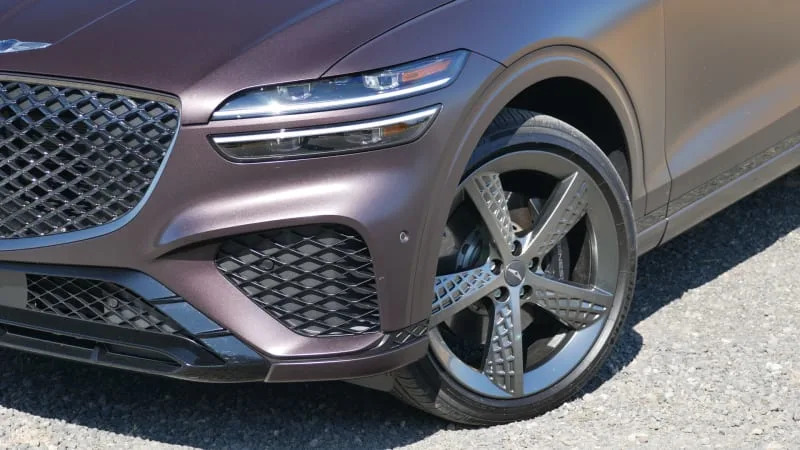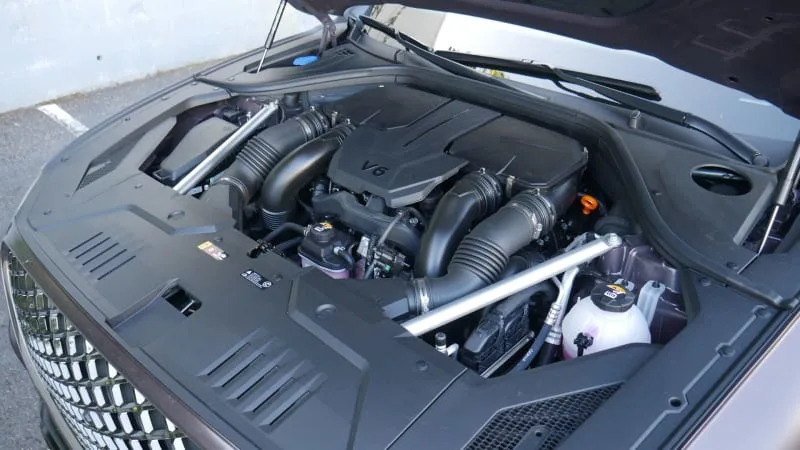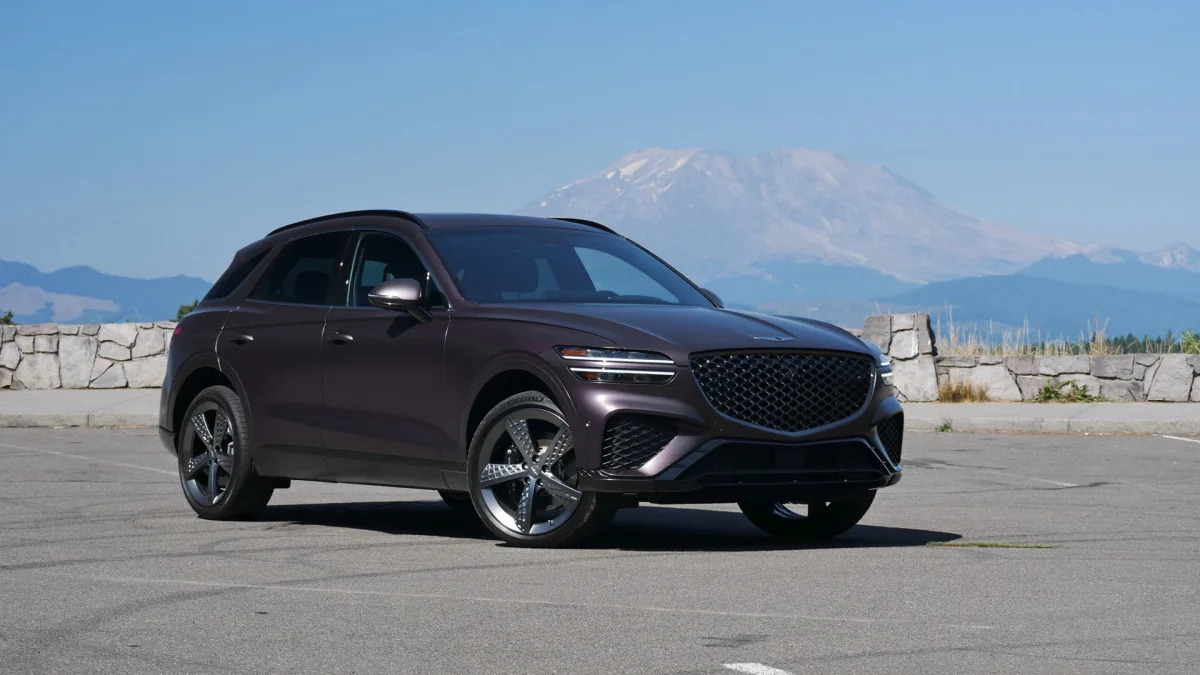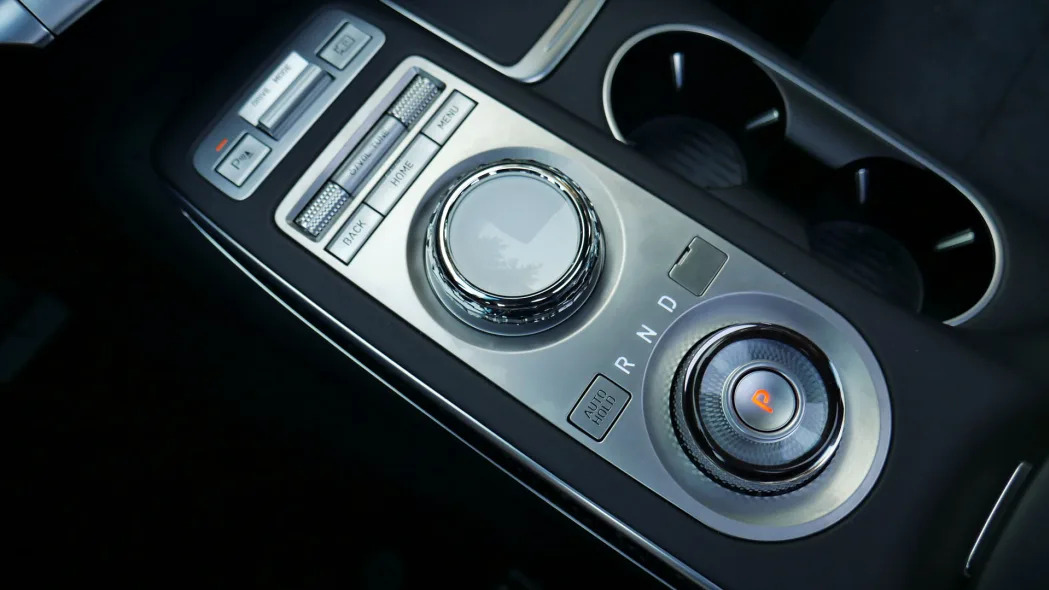-
Trim3.5T Sport Prestige
-
Engine3.5L Twin-Turbo V6
-
Power375 HP / 391 LB-FT
-
Transmission8-Speed Auto
-
0-60 Time4.4 Seconds
-
DrivetrainAWD
-
Engine PlacementFront
-
Curb Weight4,531 LBS
-
Towing3,500 LBS
-
Seating2+3
-
Cargo28.9 Cu-Ft
-
MPG19/25/21 mpg
-
Base Price$53,645 (3.5T)
-
As Tested Price$65,045
You get the sense from certain luxury brands that they're content to play second fiddle to the big names from Germany. The marketplace has spoken over the course of decades, and they don't see a path toward being equal in the minds of consumers, so why bother creating products that are truly equal?
Genesis has not reached that cynical point. It's still young, plucky and swinging for the fences. Better still, the 2022 Genesis GV70 clears that fence, sailing over it to join the upper echelon of compact luxury SUVs. It's every bit a match for a Mercedes GLC and BMW X3, while greatly surpassing the disappointingly cost-cutting Audi Q5. And although cheaper than those, it's not a vast gap. The GV70's starting point of $42,045 is far closer to the Germans than it is to the Acura RDXs and Infiniti QX50s of the world, and quite frankly, it should be. There is a solidity and polish to the GV70 that you just don't get in those more value-oriented luxury models. To put it simply, the GV70 is the real deal.
Under its skin, which for us was slathered in spectacular Barossa Burgundy matte paint, lies the same rear-wheel-drive platform as the G70 sport sedan. You can certainly see that DNA in its graceful long-hood proportions and short overhangs, which contrast sharply with its predominantly front-drive-based competition. Despite the sport sedan genes, however, the GV70 behaves more like its stately big brother, the GV80. It feels quite heavy, and, even when the available adaptive suspension is at its firmest in Sport+ mode, there's a fair bit of body roll. It sure likes to understeer, too, and it's hard to tell from the seat of your pants when you're getting overly ambitious with the throttle coming out of a corner. It won't seem like things are getting spunky, but then the stability control will jerk the seatbelts on you as if disaster is imminent. Excessively cautious nanny tech or excessive isolation? Shrug.
The steering settings also need a rethink. The Sport mode is an unfortunate throwback to the earlier days of adjustable drive settings when extra effort would be added to satisfy the false assumption that stiff equals sporty, only worse. The G70 sedan’s isn't like this, but the GV70’s extra effort simply dulls the sensations transmitted from what is already a less-than-talkative chassis. At least its Custom mode lets you sub in the perfectly acceptable "Comfort" steering while keeping everything else at full habanero, which is an atypical combo to say the least.


That the GV70 isn't as sporty as it looks is not the worst problem to have, and indeed, things are pretty much as rosy as that Barossa paint from here on out. The engine in our test car was a peach: a 3.5-liter twin-turbocharged V6 that provides a smooth, effortless power delivery indicative of bigger, pricier luxury vehicles (like the GV80). It has a nice growl over 5,000 rpm, but it's not one for histrionics. Output stands at a whopping 375 horsepower and 391 pound-feet of torque, which is on par with an AMG GLC 43, BMW X3 M40i and Porsche Macan S. The Audi SQ5 falls short and then nothing else in the segment comes close.
That the GV70 can't match the Germans' Nürburgring-ready tuning is more a matter of "different strokes for different folks" than it is a problem. There's nothing wrong with an abundance of power being paired with an emphasis on refinement, composure and comfort. The GV70 does that without completely going the Lincoln route. Its superlative ride quality greatly exceeds those similarly powered German models thanks to an adaptive suspension that pre-emptively adjusts itself using forward-looking cameras. That's fancy S-Class-level tech. We'd just think twice about the 21-inch wheels of the Sport Prestige package that add a touch of nervousness over choppy pavement and some harshness over gnarled pavement.
Of course, most GV70s are bound to come with the fixed suspension tied to the standard 2.5-liter turbocharged inline-four. The latter comes standard with all-wheel drive, effectively widening the price gap to the Germans, and produces a class-leading 300 hp and 311 lb-ft of torque. Neither of our test vehicles in Oregon or Michigan came so-equipped, so this is clearly one area where we must place an asterisk upon what is otherwise a pretty glowing experience with the GV70. A different engine and suspension could obviously dramatically change the way any car drives.

A much smaller asterisk hangs on the interior. Both test cars came with the $5,000 Sport Advanced package, which includes Nappa leather seating surfaces, buttery-soft leatherette covering the upper dash and door panels, and a suede headliner. Sadly, neither car came with the sumptuous burgundy, green or blue color options, but even in black, our GV70s had cabins that can only be described as second to none in the segment. Mercedes, Porsche, doesn't matter. The question is what the surfaces are like without that surprisingly convincing leatherette slathered on the upper parts of the interior. We must acknowledge that, but there's still plenty of the stuff on the lower dash and center console in other GV70s, plus the same quality of surrounding plastics and switchgear. The buttons move with a rich fluidity, and the touch-sensitive controls for a select number of infrequently used climate controls provide a modern, decluttered look without infuriating functionality.
The two knobs on the center console that control the infotainment system and gear selection are also high-quality pieces, resembling fine crystal. Of course, they are also virtually the same size and located adjacent to each other. I repeatedly selected XM 28 when I intended to put the car into Reverse. This sure seems like it's going to be a problem. Although both knobs have different textures, require different levels of effort to move and do their respective jobs well (unlike Jeremy Korzeniewski, I'm not as automatically averse to a rotary shifter), their proximity and similar size could lead to driver confusion. One wonders why Genesis moved away from the iPod-like track wheel found in the G80 and GV80 that avoids this situation.
Perhaps it's because the iDrive-like knob is a better tool for controlling the infotainment system than the track wheel, and you are bound to use it a great deal as the 14.5-inch widescreen display is mounted in a way that prioritizes your line of sight rather than its touchscreen capability. To be clear, this part isn't a problem. The knob is well-suited to the menu structure and helps keep your eyes on the road, while having the touchscreen capability is still helpful in certain situations like using Apple CarPlay and Android Auto. Altogether, this system is more user-friendly than what you'll find in those German competitors (as well as others), and is sufficiently pretty to boot.
It can also be paired with a 16-speaker Lexicon premium audio system. We're not expert audiophiles and as such rarely dig too deep into stereo offerings, but when something is this sensational, you notice.
Safety tech is not only plentiful, but as it is throughout the Hyundai Group, among the best-executed systems in the industry. Although the excellent Highway Driving Assist adaptive cruise control is standard, it can be upgraded to Highway Driving Assist II (exclusive to Genesis) that adds automated lane changes and GPS-linked automatic slowdown when approaching a curve. It also does a good job of keeping a realistic distance to the car ahead – we backed it off from the closest setting a few times, which is rare. The system actually tries to mimic the driver's normal behaviors, so perhaps that says something about the way we (or previous journalists) drive.
In terms of interior space, the GV70 aligns closely with other rear-drive-based compact SUVs. Like the GLC, back seat space can be surprisingly tight with a tall driver up front, and families with small kids in rear-facing car seats are bound to find a Volvo XC60 or Acura RDX a better choice. The seat itself is quite comfortable, however, with plentiful recline and sufficient headroom. Behind it is a 28.9-cubic-foot cargo area, which easily fit all six bags from our standard luggage test with room to spare. Compared to other compact SUVs we've tested, it had more space than an Audi Q5 and Mercedes GLC, is comparable to the Alfa Romeo Stelvio, and falls short of the Acura RDX.
Pricing starts at $42,045, including the $1,045 destination charge, with the 3.5-liter engine showing up at $53,645 along with a wealth of extra equipment. Some features require stepping up to the big engine, including the Nappa leather seating, heated rear seats, rear sunshades, three-zone climate control, color head-up display and the enlarged 3D-effect digital instrument panel. Add all that, plus some very pretty matte paint, and you're looking at a GV70 that costs $65,045. That's within $2,000 of a similarly equipped BMW X3 M40i, which is in keeping with their respective base prices, but an AMG GLC 43 would be $8,000 more. A Porsche Macan S is at least $16,000 more.
It's important to note, though, that the GV70 could stand toe to toe with any of those as luxury SUVs even if its price tag was even with them. It's that good, if a bit different in its approach to performance. The question is whether luxury car shoppers are willing to consider a Genesis in this price ballpark, especially once they learn the brand is related to Hyundai. Prejudices are a hard thing to break, as is the attraction and/or loyalty to top brands. Just ask Acura or Infiniti. Whatever the answer, we hope Genesis keeps swinging for the fences.
Related video:












Sign in to post
Please sign in to leave a comment.
Continue